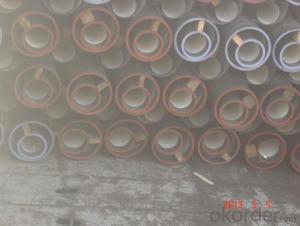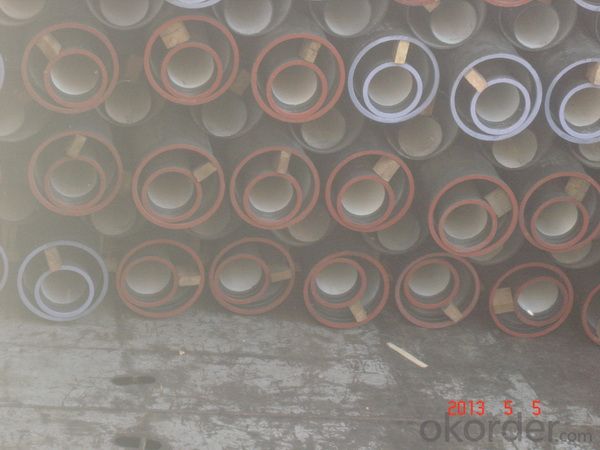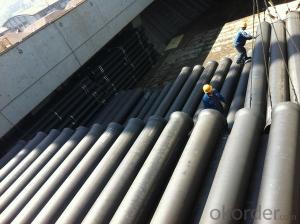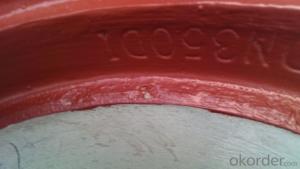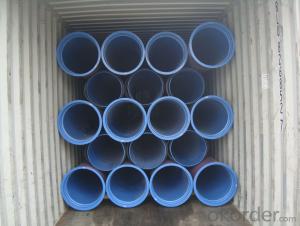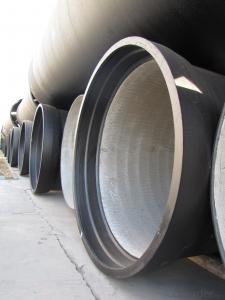T Type Ductile Iron Pipe DN350 Socket spigot pipe
- Loading Port:
- Tianjin
- Payment Terms:
- TT OR LC
- Min Order Qty:
- 200 m.t
- Supply Capability:
- 30000 m.t/month
OKorder Service Pledge
OKorder Financial Service
You Might Also Like
1) The standard of pipe: ISO2531:1998, EN545:2006,K9 K8
2) Effective length: 6m/5.7m
3) Inner cement line: Portland cement lineas per ISO4179
4) Zinc coating: at least 130g/m2 as per ISO8179
5) Bitumen painting: at least 70μm as per ISO8179
6)With 102% quantity of NBR, SBR, or EPDM ring asper ISO4633
7) DN80-DN1200
8) Highstrength, lighter than grey iron, good corrosion resistance, no furring, smallflow resistance, easy fixing, long life tome about 100 yeas
9)Checked by automatic inspection equipment
10) Composition:
Chemical composition | |||
Chemical composition | Ductile Cast Iron Pipe (%) | Grey iron pipe (%) | Steel pipe (%) |
C | 3.5-4.0 | 3.2-3.8 | 0.1-0.2 |
Si | 1.9-2.6 | 1.4-2.2 | 0.15-0.4 |
Mn | 0.15-0.45 | 0.4-0.6 | 0.3-0.6 |
P | ≤0.06 | ≤0.3 | 0.02-0.03 |
S | ≤0.02 | ≤0.1 | 0.02-0.03 |
Mg | 0.03-0.06 |
|
|
11) Feature:
Mechanical properties | |||
| Ductile Cast Iron Pipe | Grey Iron Pipe | Steel Pipe |
Tensile Strength(Mpa) | ≥420 | 150-260 | ≥400 |
Yield Strength(Mpa) | ≥300 | No Confirmation | No Confirmation |
Bending Strength(Mpa) | ≥590 | 200-360 | ≥400 |
Elongation (%) | ≥10 | Neglected | ≥18 |
Brinell Hardness(HBS) | ≤230 | ≤230 | About 140 |
12) T type mechanical joint
13) Packing: in bulk or container
PACKING: 1) Pipesare bundled together with the steel belt.
2) Wooden pieces are put between the pipes.
- Q: What is the average cost of ductile iron pipes?
- The cost of ductile iron pipes can differ based on factors like diameter, length, and location, resulting in varying averages. Typically, the price range for ductile iron pipes is $30 to $100 per linear foot. To illustrate, a 6-inch diameter ductile iron pipe that is 20 feet long could cost approximately $600 to $2,000. It is crucial to understand that these figures are approximations and subject to alteration due to market conditions, project specifications, and supplier pricing. Thus, it is advisable to consult local suppliers or contractors for precise pricing details regarding specific projects.
- Q: Can ductile iron pipes be used in potable water systems?
- Yes, ductile iron pipes can be used in potable water systems. Ductile iron is a suitable material for water distribution systems as it has excellent durability, strength, and corrosion resistance. It is commonly used in potable water systems due to its ability to withstand high water pressure and its long service life. Additionally, ductile iron pipes are also approved by various national and international standards for use in potable water applications.
- Q: Can ductile iron pipes be used for water supply in remote areas?
- Yes, ductile iron pipes can be used for water supply in remote areas. Ductile iron pipes are known for their strength, durability, and versatility, making them suitable for various applications, including water supply systems. These pipes have a high resistance to corrosion and can withstand harsh environmental conditions, making them ideal for remote areas where the availability of maintenance and repair services may be limited. Additionally, ductile iron pipes have a longer lifespan compared to other materials, ensuring the longevity of the water supply system in remote areas. Overall, ductile iron pipes are a reliable choice for water supply in remote areas due to their durability, corrosion resistance, and long lifespan.
- Q: Can ductile iron pipes be used in culvert or storm sewer applications?
- Yes, ductile iron pipes can definitely be used in culvert or storm sewer applications. Ductile iron pipes are known for their strength, durability, and flexibility, making them ideal for such applications. They have the ability to withstand heavy loads, resist corrosion, and handle high flow rates, making them a reliable choice for culverts and storm sewers. Ductile iron pipes also have a long service life and require minimal maintenance, further adding to their suitability for these applications. Additionally, ductile iron pipes can be easily installed and are available in various sizes and configurations to meet the specific requirements of culvert or storm sewer projects. Overall, ductile iron pipes are a proven and widely used option for culvert or storm sewer applications, providing efficient and long-lasting performance.
- Q: Can ductile iron pipe be used for underground storage tank systems?
- Yes, ductile iron pipe can be used for underground storage tank systems. Ductile iron pipe is known for its durability and strength, making it suitable for various applications, including underground storage tanks. Its high tensile strength and resistance to corrosion make it an ideal choice for containing and transporting liquids or gases in underground environments. Additionally, ductile iron pipe is highly resistant to external pressures and can withstand heavy loads, making it a reliable option for underground storage tank systems.
- Q: Can ductile iron pipes be used for stormwater drainage?
- Yes, ductile iron pipes can be used for stormwater drainage. Ductile iron pipes are known for their strength, durability, and ability to withstand heavy loads, making them a suitable choice for various applications, including stormwater drainage systems.
- Q: What is the typical wall thickness of ductile iron pipes?
- The typical wall thickness of ductile iron pipes varies depending on the size and the intended use of the pipe. Generally, ductile iron pipes have a wall thickness ranging from 0.25 inches (6.35 mm) to 0.5 inches (12.7 mm). However, for larger diameter pipes or those used in high-pressure applications, the wall thickness can be even greater. It is important to consult industry standards and specific project requirements to determine the appropriate wall thickness for a ductile iron pipe.
- Q: Are ductile iron pipes suitable for use in hydroelectric dams?
- Yes, ductile iron pipes are suitable for use in hydroelectric dams. Ductile iron is a type of iron that has a higher degree of flexibility and strength compared to traditional cast iron. This makes it an ideal choice for many applications, including water transmission systems in hydroelectric dams. Ductile iron pipes are known for their durability and resistance to corrosion, which is crucial in a dam environment where water exposure is constant. They can withstand high pressures and extreme temperatures, making them suitable for the demanding conditions found within hydroelectric dams. Additionally, ductile iron pipes have excellent joint integrity, ensuring that they remain leak-proof and reliable over their lifespan. This is important for maintaining the efficiency and effectiveness of a hydroelectric dam's water transmission system. Furthermore, ductile iron pipes are cost-effective compared to other materials, such as steel or concrete. They have a long service life, require minimal maintenance, and are readily available, making them a practical choice for hydroelectric dam projects. In conclusion, ductile iron pipes are a suitable choice for use in hydroelectric dams due to their durability, resistance to corrosion, high-pressure tolerance, joint integrity, and cost-effectiveness. They provide the necessary strength and flexibility to efficiently transport water within the dam, contributing to the overall success and longevity of the hydroelectric power generation system.
- Q: How are ductile iron pipes protected against erosion caused by high-velocity flow?
- Ductile iron pipes are protected against erosion caused by high-velocity flow through various methods. One common approach is to apply an internal lining to the pipe, which can be made of materials such as cement mortar or polyethylene. This lining provides a smooth surface that reduces the friction and turbulence of the flowing water, thus minimizing the erosion potential. Additionally, external coatings, such as bitumen or epoxy, can be applied to protect the outer surface of the pipe from erosion caused by external factors like soil movement or abrasive materials. Regular inspection and maintenance of the pipes also play a crucial role in identifying and addressing any erosion-related issues to ensure their long-term durability.
- Q: Do ductile iron pipes require external protection against stray electrical currents?
- Yes, ductile iron pipes do require external protection against stray electrical currents. This is necessary to prevent corrosion and ensure the longevity of the pipes.
Send your message to us
T Type Ductile Iron Pipe DN350 Socket spigot pipe
- Loading Port:
- Tianjin
- Payment Terms:
- TT OR LC
- Min Order Qty:
- 200 m.t
- Supply Capability:
- 30000 m.t/month
OKorder Service Pledge
OKorder Financial Service
Similar products
Hot products
Hot Searches
Related keywords
